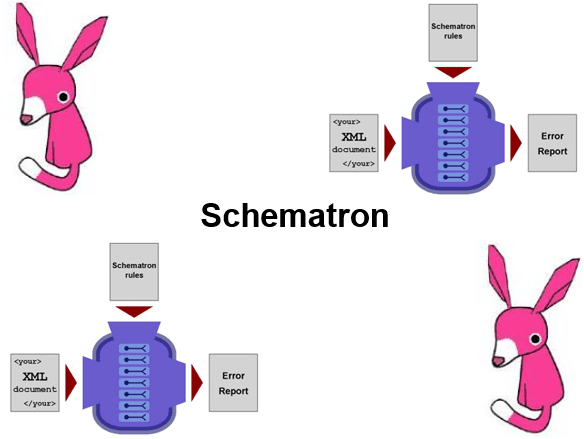-
Learning by doing
-
Trainers with practical experience
-
Classroom training
-
Detailed course material
-
Clear content description
-
Tailormade content possible
-
Training that proceeds
-
Small groups
The course Schematron covers the rule-based validation language Schematron, which can be used to test the presence of patterns in XML documents. Schematron allows for the creation of validation rules that are not possible with XML Schemas and DTDs.
The course begins with an introduction to Schematron, a powerful XML validation technique. A comparison is made between Schematron and other validation methods like XSD and Relax NG. The ISO standard for Schematron, its versions, and how to create Schematron files are covered. The module ends with the installation of Schematron tooling.
In this module, participants learn about the structure of a Schematron schema. Topics include using namespaces, schema hierarchy, and the role of elements such as pattern, rule, assert, and report. There is also a focus on writing clear validation rules and generating useful reports.
This module dives into how Schematron validations are processed using XSLT and XPath. Participants learn how to define validation rules with XPath, handle namespaces and wildcards, and deal with complex conditions. Stylesheets for validation and their implementation are also covered.
Participants are introduced to rule declaration within Schematron. The use of rule elements, context attributes, and phases is discussed. The module also covers how to group assertions, restrict validation context using XPath node selection, and work with assertion test attributes.
This module focuses on grouping rules into patterns for modular validation. Topics include the use of the name attribute, co-occurrence constraints, and reducing complexity. Techniques for handling failed assertions, identifying the source of failures, and generating diagnostic messages are also covered.
The course concludes with advanced topics such as using value-of in assertions, defining abstract rules, and generating validation reports. Additional topics include XML pipelines, inter-document constraints, and how Schematron interacts with namespaces and abstract/concrete schema mappings.
The course Schematron is intended for data quality analysts, XML architects and software engineers who work with XML.
Basic knowledge of XML and XPath is required. Familiarity with XSLT and XML Schema (XSD) is useful, but not required.
Explanation using slides and demos led by the trainer are interchanged with practical exercises.
After successfully completing the course, attendants will receive a certificate of participation in the Schematron course.

Module 1: Schematron Intro |
Module 2: Schematron Structure |
Module 3: Schematron Processing |
|
What is Schematron? XML Validation Techniques Schematron versus XSD Schematron versus Relax NG Schematron ISO Standard Schematron Versions Schematron Files Schematron Implementation Installation Schematron Tooling |
Schematron Schema Namespace Schematron Schematron Hierarchy Pattern Element Rule Element Assert Element Report Element Writing Assertions Creating Reports |
Schematron and XSLT or XPath XSLT Schematron Processors XPath Schematron Processors Validation Rules with XPath Handling Namespaces Wildcards in XPath Complex Conditions Schematron Stylesheets Validating Stylesheets |
Module 4: Schematron Rules |
Module 5: Patterns |
Module 6: Advanced Topics |
|
Rule Declaration Rule Element Context Attribute Schematron Phases XPath Node Selection Grouping Assertions Assertions as Childs Restricting the Context Assertions test Attribute |
Patterns Grouping Rules Modular Validation Name Attribute co-occurrence Constraint Decreasing Complexity Wrapping Patterns in Schema Failed Assertions Location Source of Failure Diagnostic Messages |
value-of in Assertions Abstract Rules Validation Reports XML Pipelines Namespaces and Schematron Concrete Schema's Mapping Abstract Schema's Non-regular Constraints Inter-document Constraints |
